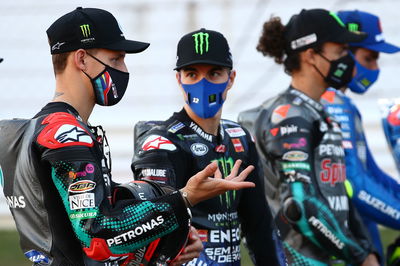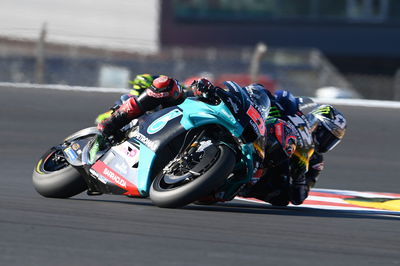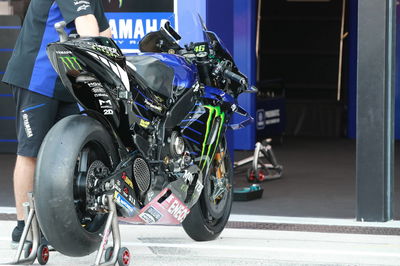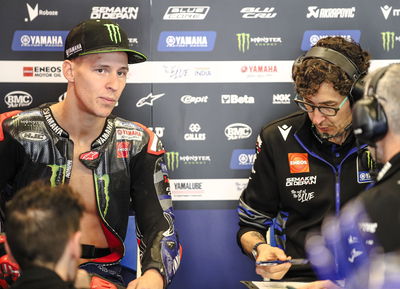Yamaha: Achilles' heel, 7 victories, missed opportunities…
2020 was a season of 'missed opportunities' for Yamaha, which won more than twice the number of races of any other manufacturer but still lost out on the MotoGP riders', constructors' and teams' titles.
The constructors' crown was snatched away by a late 50-point penalty for breaking the engine homologation rules, due to the use of two different valve suppliers at the start of the year (teams' points were also docked, but didn't change the outcome).

2020 was a season of 'missed opportunities' for Yamaha, which won more than twice the number of races of any other manufacturer but still lost out on the MotoGP riders', constructors' and teams' titles.
The constructors' crown was snatched away by a late 50-point penalty for breaking the engine homologation rules, due to the use of two different valve suppliers at the start of the year (teams' points were also docked, but didn't change the outcome).
The breach had emerged as Yamaha negotiated with its rivals over a batch of faulty valves discovered at the opening Jerez rounds, where a series of technical failures soured a pair of one-two finishes by Fabio Quartararo and Maverick Vinales.
This "Achilles' heel" would haunt Yamaha and its riders for the rest of the season, the faulty engines being parked and forcing extra milage on the remaining powerplants, which had to be detuned as a result.
Yet the factory still managed to win 7 of 14 races (KTM was next best with three) and it was inconsistent form, rather than peak engine performance, that cost Yamaha the riders' title.
After their perfect start to the season, see-sawing fortunes for Quartararo and Vinales (the only Yamaha rider to require an extra engine) saw them slip to eighth and sixth respectively in the final standings.
Adding to their frustration, Franco Morbidelli made a late-season charge on the lower A-Spec machine (based closely on the 2019 bike) not only matching Quartararo for three race wins this year but snatching second in the world championship behind Suzuki's Joan Mir.
"We've had our ups and downs throughout the year," said Yamaha managing director Lin Jarvis. "Obviously we started on a big high at the beginning of the season with one-two in the Jerez races.
"But whilst we won the races, immediately in Jerez we discovered our Achilles' heel. And our Achilles' heel this year was the valve problem that we suffered from round one. Already from FP1 Maverick had the first problem, then in the race Valentino stopped, then Frankie Morbidelli stopped in race two.
"So this Achilles' heel has been following us all year long and that obviously disturbed the chance for some of our riders to make better performances sometimes because we had to modify the engines, detune the engines, and then we parked a lot of engines.
"We parked eight engines for virtually the whole year. So we've been running in a very strange, stressed and difficult situation for our riders above all. Finally that's taken a toll at the end of the year when we had this resolution in Valencia and got the penalty that affected the constructors' and teams' championship but fortunately not the riders'.
"But it's been a hard year, to manage in Covid and manage with that problem, it's been like having a rucksack with many kilos on your back.
"That said, on the positive side we saw many race victories, so our bike was clearly a strong bike this year, capable to win in many different circumstances. It's been a bit unusual as well because the Petronas team won six races and the factory team only one race.
"But obviously the bike had the potential and was able to win races, but we have not achieved our goal which is obviously to win the world championship. Chapeau to Suzuki because they've been very consistent, they've put together a good campaign, Joan Mir has shown his maturity and they won the championship.
"So I would say it's been missed opportunities from our side."

Inconsistency from one track to the next, usually linked to grip, has often plagued Yamaha in recent seasons. It took a new twist in 2020 as riders struggled to put together two strong results even during back-to-back events at the same circuit.
"Unfortunately this [inconsistency] is a bit of a problem we've been dealing with for the past three years actually and in some other years it's been more extreme than this year. We're always struggling with grip, with traction and therefore also with braking," Jarvis said.
The quest for a solution was also hampered by travel restrictions due to the Covid pandemic, which meant superstar test rider Jorge Lorenzo was barely used.
"I think we've been handicapped this year; we had a new bike spec with a new engine and chassis, but we have hardly done any testing apart from the official testing with the factory contracted riders," Jarvis confirmed.
"We took Jorge Lorenzo under contract and we had a full testing programme planned for this year. But we were using a Japanese testing team with some European staff and Jorge. In reality we only ran him for two days in Sepang and then finally the pre-Portimao test.
"So all other activities that we planned to do this year, unfortunately, were cancelled [due to Covid] and I think that was definitely negative for us this year because we couldn't work on the issues and I still think Jorge would have been an excellent test rider to do that job."
By the end of the year, Quartararo and Vinales were openly questioning the selection of the Factory-Spec bike this season.
While Morbidelli and the A-Spec romped to two wins, three podiums and 81 points during the last five rounds, Vinales slumped to 36 points and Quartararo just 12 points.
Jarvis conceded "the bike has not been able to deliver, by design, consistent performances under all race tracks. That's not directly related to the valve problem. That's another matter, of fundamental design."
The Englishman added that "statistically more of the wins have been on the new Factory-Spec," but there were also three times as many Factory-Spec M1s on the grid compared to the A-Spec.
Jarvis explained that striking a balance between bike development and sticking with what you know is always a risky business, but emphasised that an unchanged bike won't stay competitive for long in MotoGP.
"It depends on the track, it depends on the circumstance, but sometimes in order to move forward you lose something along the way as well and it’s very difficult to constantly improve," he said.
"And when you are with a Factory-Spec you need to progress, you can't stay with what you have and expect to be competitive in the future.
"So maybe on this occasion I think Frankie has done exceptionally well - and we saw also last year in Fabio's case, he didn’t win a race but he was very strong on his package and sometimes working with the package you have is better than constantly developing and looking and searching for new things.
"So it's always a trade-off and always a balance."

'Engine error was made in the middle of last year'
The valve saga and perennial lack of top speed means Yamaha's engine department is under the spotlight more than ever for 2021.
But while no engine design changes are allowed for the top manufacturers until the start of 2022, Jarvis is encouraged by how the current engine performed when fitted with the correct valves.
"I don’t really expect any major changes to our engine department in the near future," Jarvis said.
"I think the error that we made this year, was made in the middle of last year when our valve supplier told us they couldn't continue production of the valves we wanted to use.
"At that time Yamaha took this decision to have two valve suppliers and that was their misunderstanding of the regulations.
"So I think in terms of the pure engine department, our engines honestly speaking apart from the weakness of some valve batch that we had, have been very reliable for the rest of the season.
"Some of our engines have done more than 3,000 kilometres, which is pretty extraordinary. And they've had to do that because we had to park a whole load of engines.
"So I think the main attention for the future improvements we will make is a much more rigid attention to detail, in the way that we plan the season. reconfirming on the quality of components, reconfirming on the regulations. So a lot more reconfirmation will be required.
"For the 2021 season we are quite confident to be frank with our engines because of the reliability that we've seen when using the right valves for most of this season.
"As you know the regulations mean we will continue to use those engines next year. we're always missing horsepower so we could do with some more horsepower, but we are going to have to wait until 2022 to get that when we are able to develop the engines."
Yamaha will keep the same four race riders in 2021, but with Rossi and Quartararo swapping places while Cal Crutchlow replaces Lorenzo as test rider.












